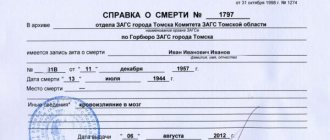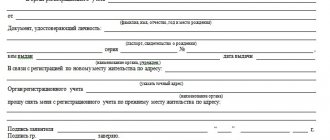General procedure for discharging a minor child from an apartment
The child's discharge from the apartment will be required if the family changes their place of residence, the child does not actually live at the place of registration, or the spouses divorce and go to different homes.
In order for a child to be discharged, his parents need to go through several steps. These include:
- submit an application requesting an extract (at the MFC or local passport office). The application can be submitted by one of the parents;
- fill out a decree form at the government agency;
- collect the necessary documents;
- wait until the verification of the submitted application and documentation is completed;
- receive a document confirming the extract;
- register the minor at a different address (the next 2-3 days are given for this). If there is no new registration, the child’s representatives will be fined or face administrative punishment.
It is impossible to discharge a minor child from an apartment if there is no new place for registration.
Parents should consider several other factors. They relate to the child himself and the characteristics of discharge:
- Children under 14 years of age do not have the right to sign documentation; if they are older, then they can, but in the presence of their representatives.
- If the child is registered with relatives who want to discharge him, but the parents are against this, the case is considered by the guardianship council.
- If the minor has both parents, then both of them must give their permission for discharge.
- It is impossible to discharge a child without the mother’s permission. Exception: a woman has been deprived of parental rights, has gone missing, has not taken part in the child’s life since his birth, or for serious reasons cannot be in government agencies (this must be documented).
- It is possible to discharge a minor from the apartment of the owner of the property, without the personal presence of the owner of the property, if the child is not a co-owner of this living space.
The guardianship council monitors the observance of the child's rights, and if they are violated, it always acts in the interests of the minor. The Constitution of the Russian Federation, Civil, Housing and Family Codes of the Russian Federation also protect the rights of the child to permanent housing.
Step-by-step instruction
The regulations for all stages of a child’s discharge from departmental housing are as follows:
- Step 1. Preparation of a certificate about everyone who lives and is registered in a municipal apartment (room), plus information about their personal accounts. You can order it at the passport office and multifunctional center by providing an internal civil passport, a child’s document, or a document confirming the social rental of a departmental home.
- Step 2. Submitting a request for consent to discharge from the local representative of the guardianship authorities. Here the applicant will be required to:
- passport of a citizen of the Russian Federation;
child’s document (certificate or passport);
- document confirming social employment;
- certificate of family composition;
- personal account data;
- title document for a new property (purchase and sale agreement, social tenancy agreement, etc.)
- Step 3. Writing a statement of intention to remove the minor from the departmental apartment with the obligatory indication of his new address of registration.
Important! Since 2020, the title document for an apartment is an Extract from the Unified State Register of Real Estate about the property. When accepting a package of documents, employees of the guardianship department can request from the applicant a registration certificate for the home: the previous one and the new one.
We invite you to familiarize yourself with: The procedure for drawing up a sample agreement on the privatization of an apartment under the current procedure for the privatization of an apartment under a social tenancy agreement
As a rule, consideration of these requests by the guardianship authorities lasts 14 days, after which the applicant is issued a consent document for the child’s discharge. However, the parent (guardian) can also receive an official refusal if the guardianship authorities identify dubious issues or the documentary base is insufficient.
More information about the procedure for discharging a child from an apartment can be found here.
What the law says
The guarantor of the rights of a minor to housing are the Constitution of the Russian Federation and the Family Code.
According to these documents, a citizen under 18 years of age has the right to live with his parents or legal representatives at their place of registration. In addition, he acquires rights to their real estate.
Legal representatives are required to register the child in their own or municipal housing at the same address where they themselves live. Monitoring compliance with this provision of the Civil Code of the Russian Federation (Article 20) by guardianship and trusteeship authorities.
Article 20. Place of residence of a citizen
- Place of residence is the place where a citizen permanently or primarily resides. A citizen who informs creditors, as well as other persons, about his other place of residence bears the risk of the consequences caused by this.
- The place of residence of minors under fourteen years of age or citizens under guardianship is recognized as the place of residence of their legal representatives - parents, adoptive parents or guardians.
If the father and mother live and are registered at different addresses , then the child is registered at one of these addresses (we talked about whether it is possible to register and discharge a child from the apartment of one of the parents without his consent here). At the same time, the consent of all residents of the apartment where he will be registered is not necessary (Article 70 of the Housing Code of the Russian Federation).
Article 70. The right of the tenant to move other citizens into the residential premises he occupies under a social tenancy agreement as members of his family
- The tenant, with the written consent of his family members, including temporarily absent family members, has the right to move into the residential premises he occupies under a social tenancy agreement his spouse, his children and parents, or with the written consent of his family members, including temporarily absent members of his family, and the lessor - other citizens as members of his family living with him. The landlord may prohibit the move-in of citizens as family members living with the tenant if, after their move-in, the total area of the relevant residential premises per family member is less than the accounting norm. The consent of the other members of the tenant's family and the consent of the landlord are not required to move in with the parents of their minor children.
- Moving into residential premises of citizens as members of the tenant's family entails a change in the relevant social tenancy agreement regarding the need to indicate in this agreement a new member of the tenant's family.
Does the owner have the right to remove a child from his apartment?
Can the owner remove a child from the owner’s apartment? The law of the Russian Federation reserves the right of a citizen to dispose of his own property at his own discretion .
But in order to complete a transaction for the alienation of real estate, it is necessary to deregister all residents of it. There will be no problems with the removal of adult citizens.
And if a person under 18 years of age is registered in the living space , even if he lives at a different address, he will have to comply with some conditions and take additional measures.
How to discharge a minor child from the owner’s apartment? The owner has the right to discharge a minor without the consent of the guardianship authorities.
But if the court reveals facts of infringement of his rights, he can restore him in registration. Therefore, upon discharge, it is necessary to provide and take into account the following nuances :
- Any actions related to the registration of a minor are carried out jointly with parents (legal representatives) .
- The right to sign when drawing up documents for children under the age of 14 belongs to their legal representatives.
- from 14 to 18 years of age prepares documents independently, but in the presence of parents (or guardians).
- If an adult has both a father and a mother, both must give consent to deregistration.
- If a child is registered in the apartment of relatives, and the parents do not agree with his discharge, the issue is resolved through the court. This takes into account where he actually lives.
- A child under 14 years of age is deregistered only together with one of the parents.
- To deregister, you must have proof that the child will be registered at a different address. Moreover, the conditions at the new place of registration must be no worse than the previous one. For example, you cannot discharge him from a separate apartment to a communal one.
- A separate requirement may be that new housing is located in the same area as the previous one.
The reason for this requirement is that the child, when moving, has the opportunity to attend the same educational institution as before. If this rule cannot be observed, then the permission of the specialists from the guardianship authorities conducting the conversation with the minor is required.
We discussed in more detail the question of whether the owner has the right to expel others from his apartment - former spouses, children - here, and on what basis and under what conditions minors can be expelled, we consider in detail in this material.
If the person is under 18 years of age
The owner must familiarize himself with the provisions of the law:
- Art. Civil Code - establishes that a son or daughter under 18 years of age can live only with their parents or with one of them;
- Family Code - determines the right of a minor child to live together;
- Housing Code - prescribes housing standards per person, which are also valid when children’s registration changes. It also establishes a preferential right to registration without the consent of the owner;
- Convention on the Rights of the Child - protects the right of minors to housing.
Employees of the passport office and other authorities are guided by presidential decrees and federal laws when carrying out operations involving the registration of children.
After 14 years
Persons from 14 to 18 years old retain the rights of minors. The discharge of a child is subject to legal provisions applicable to citizens under 18 years of age. The difference is that the requirements of Art. Civil codes on cohabitation with parents are not taken into account.
Be sure to read it! Increment of inherited shares: grounds and rules of procedure
Is it possible to discharge a child from a private home?
Advice from lawyers:
1. Is it possible to discharge an adult child from a private home without his consent?
1.1. Hello! Yes, it's possible.
Did the answer help you?YesNo
1.2. It is possible only in court in accordance with Article 31 of the Housing Code of the Russian Federation.
Did the answer help you?YesNo
Consultation on your issue
8
Calls from landlines and mobiles are free throughout Russia
2. Is it possible to discharge an infant and his mother from a private home, to nowhere?
2.1. Only in court (Article 30 of the RF Housing Code)
Did the answer help you?YesNo
2.2. This is possible only if the court makes such a decision; reasons are needed for this.
Did the answer help you?YesNo
2.3. If there are grounds, legal action is possible. We need to know the details.
Did the answer help you?YesNo
3. Is it possible to discharge a wife from a private home, but not discharge the children?
3.1. Can! Judicially…
Did the answer help you?YesNo
3.2. Tatyana, good afternoon! If the property is someone’s personal, and not jointly acquired during marriage. Then you can. All the best,
Did the answer help you?YesNo
4. At the age of 16, my husband’s mother kicked me out of a two-room apartment, which she received for two children after her husband’s death, and registered my husband with his grandmother in a private house. My grandmother died, now my mother-in-law is the owner of this house and kicks us out and doesn’t allow us to build. My husband and 3 of our children are registered there, 2 of the children are minors. Please tell me whether it is possible through the court to register in an apartment that is now privatized.
4.1. A privatized apartment is already property. The owner has the right to decide who to register. You can also be expelled from your mother-in-law's house only by court. And even then you need compelling reasons with evidence) Minor children only with the permission of the guardianship authorities.
Did the answer help you?YesNo
4.2. The matter is complicated. Many violations of the law. I think that your husband may well recover in the apartment. Hire a good housing lawyer. Your husband has a lot of chances, but you yourself are unlikely to be able to “pull through” such a complex matter.
Did the answer help you?YesNo
5. Is it possible to discharge a sister and a minor child from a private home? The house burned down 10 years ago, the land is mine. She doesn't want to check out.
5.1. Hello 1 yes it is possible. File a claim in court.
Did the answer help you?YesNo
5.2. If there is actually no home, how can one be discharged from it? Documents must be submitted to Rosreestr stating that the object has actually been destroyed, it will be deregistered and that’s it. Where to evict from if there is nothing?
Did the answer help you?YesNo
6. Is it possible to discharge a minor child from a private house where the owners are grandparents. If parents and children move to another city for permanent residence.
6.1. Hello Svetlana. If the grandparents are the owners of a residential building, and the parents and the child have moved to another place of residence and will not live in this residential premises for a long time, then it will be possible to remove a minor child from the registration register in two cases: 1) voluntarily; 2) or through court (if a dispute arises).
Did the answer help you?YesNo
7. Is it possible to discharge my children (9 and 12 years old) from a private home? I am the only owner of the house, my wife has a residence permit in Moscow. We are officially divorced, my wife and children have been living abroad for 4 years. I'm going to sell the house. Thanks Vladimir.
7.1. It is possible, through the district court, by recognizing them as having lost the right to use residential premises. As the owner of residential premises, you have the right to be guided by the provisions of Article 304 of the Civil Code of the Russian Federation, Articles 30, 31, 34, 35 of the Housing Code of the Russian Federation. So it goes.
Did the answer help you?YesNo
7.2. Hello. Yes, you can write it out in court.
Did the answer help you?YesNo
8. My daughter and I are registered in the private house of my former common-law husband. Is it possible to discharge a minor child (13 years old) without the consent of the mother from the private property of the common-law husband (not the child’s natural father)?
8.1. Hello! Of course you can. Your former partner is not obliged to provide housing for you and your child; you are not members of his family. Legally, you are strangers to him.
Did the answer help you?YesNo
9. Is it possible to discharge two minor children from a private home if a single mother is registered in the same house.
9.1. Dear site visitor! To answer this question, you must, at a minimum, know who owns the house and on what basis this woman is registered in the house.
Did the answer help you?YesNo
9.2. Good evening! According to the law, minor children must be registered at the place of residence of their parents. There is nothing else in the law. You can register elsewhere and register your children with you.
Did the answer help you?YesNo
10. Is it possible to discharge a minor child from the private home of the common-law wife’s mother without the child’s father?
10.1. Hello! You can be discharged if there is somewhere to register the child. The court will not discharge the minor anywhere.
Did the answer help you?YesNo
11. I have a question for you: is it possible to discharge a child from a private home; he is registered with his father but lives with his mother; the parents are divorced! Thank you.
11.1. Dear Natasha, this is possible, in principle, in court at the request of the owner of this house, if, say, the owner is not the father, but someone else.
Did the answer help you?YesNo
11.2. Your question can be solved much easier. You should apply to the court to determine the child’s place of residence with you. After a positive court decision, you will be able to register the child with you, and the OVM will independently discharge him from his father’s apartment.
Did the answer help you?YesNo
12. Is it possible to discharge a mother without minor children from a private house when the house belongs to the grandfather of the children’s father.
12.1. Hello, Inna! According to the Family Code of the Russian Federation, minor children must live and be registered with at least one of the parents.
Did the answer help you?YesNo
13. Is it possible to discharge a mother with a minor child from a private home? They are simply registered without a share in the house.
13.1. Vadim, hello. Housing legislation allows this to be done. To understand, you need a more detailed description of your situation.
Did the answer help you?YesNo
13.2. Hello! In principle, the owner has the right to deregister other persons who are not owners from registration in court, on the basis that they are not members of his family. Therefore, if they are not deregistered voluntarily, go to court.
Did the answer help you?YesNo
Consultation on your issue
8
Calls from landlines and mobiles are free throughout Russia
14. Is it possible to discharge a minor child from a private home if he and I have temporary registration (upon arrival)?
14.1. Hello! Yes, you can write it out. If you are the owner and object to his registration in this private house.
Did the answer help you?YesNo
15. Is it possible to discharge underage children from a private house if the owner is my mother?
15.1. — Hello, you can only do it together with their parent and nothing else. If children are over 14 years old. it’s not a fact that in court you will be deregistered. Good luck to you and all the best, with respect, lawyer Legostaeva A.V.
Did the answer help you?YesNo
15.2. Good afternoon, Alena Mikhailovna! The owner can forcefully remove you from registration through the court. If you are deregistered, then your children will lose the right to reside and register in the house. You can always find a way out of any situation. Good luck to you and all the best in your endeavors.
Did the answer help you?YesNo
15.3. Is it possible to sign out underage children from a private house? Is it possible to sign out underage children from a private house if the owner is my mother? It is possible, for this she will go to court. But it is necessary that the parents are not registered with the mother. Or evict everyone at once.
Did the answer help you?YesNo
15.4. Good evening Alena Mikhailovna, in order to answer you, you essentially need to know on what basis they and their parents were registered there, only after that will it be possible to give a specific answer to this question.
Did the answer help you?YesNo
16. Is it possible to discharge a minor child from a private home before the onset of... If one of the parents is registered with him and has his own share.?
16.1. Hello. A minor child can be discharged from home and registered in another residential premises if one of his parents is registered in the same other residential premises. (if the child is under 14 years old, he cannot be registered separately from his parents). If the child also has his own share, then the consent of the guardianship authority will be required.
Did the answer help you?YesNo
17. Is it possible to discharge a minor child from a private home before reaching adulthood?
17.1. — Hello, it is possible if neither of his parents is registered with him at this address. Good luck to you and all the best, with respect, lawyer Legostaeva A.V.
Did the answer help you?YesNo
18. An ex-wife and her child are registered in the son’s private house (divorced, the child is not his and not adopted), but she has not lived in the house for 7 years and does not pay utilities. Their common child is also registered in the house, but the mother is deprived of parental rights to him (the common child). Based on the above, is it possible to discharge her and her child from this home?
18.1. If the wife is not the owner, then of course she and her child can be discharged in court, but if she is the owner, then this cannot be done.
Did the answer help you?YesNo
19. Is it possible to discharge an ex-husband from a private house through the court if the house was purchased during marriage, but he transferred his ¼ share to his son, and the son to me. In our marriage, we had two children - a 25-year-old son and a 17-year-old daughter. He doesn’t pay alimony (I applied for alimony 3 years ago). The marriage was dissolved on January 13, 2015. At the moment, I am the owner of ¾ of the share and my daughter ¼. Thank you.
19.1. According to paragraph 1 of Art. 40 of the Constitution of the Russian Federation “Everyone has the right to housing. No one can be arbitrarily deprived of their home.” In accordance with Part 4 of Art. 31 of the Housing Code of the Russian Federation, in the event of termination of family relations with the owner of a residential premises, the right to use this residential premises for a former family member of the owner of this residential premises is not retained, unless otherwise established by an agreement between the owner and the former member of his family. If a former family member of the owner of a residential premises has no grounds for acquiring or exercising the right to use another residential premises, and also if the property status of a former family member of the owner of a residential premises and other noteworthy circumstances do not allow him to provide himself with another residential premises, the right to use the residential premises owned by the specified owner may be retained by a former member of his family for a certain period based on a court decision.
In this connection, Tatyana, you will need to prove that your ex-husband has the right to use another residential premises, or he can provide himself with it, in this case the court can satisfy the claim for recognition as having lost the right to use the residential premises, eviction and deregistration registration, otherwise he will retain the right to use the house.
Did the answer help you?YesNo
20. Is it possible to register the family of the old owner with a minor child in a private house on the condition that 3 years ago they purchased an apartment from me and did not check out of the house.
20.1. Yes, you can write it out. You need to file a claim with the court to terminate your right to housing. By decision of the court, the registration will be removed.
Did the answer help you?YesNo
20.2. Hello, of course you can, go to court with a statement of claim to remove persons from registration. Good luck and all the best.
Did the answer help you?YesNo
20.3. Good day! You can write it out, but in this case only in court, recognizing that you have lost the right to use the residential premises. All the best, I wish you good luck!
Did the answer help you?YesNo
20.4. Good evening! Of course, you can write it out, but to do this you will have to go to court with a claim to declare that you have lost the right to use the residential premises and deregister them.
Did the answer help you?YesNo
Is it possible to discharge minor children from an apartment and register them in a private home? Will guardianship allow it?
The question is: can I discharge my son and his minor children from a private
Is it possible to register a child with his father in a private home after first checking him out of the apartment where the mother is registered?
Is it possible to discharge a minor child from a private home if he lives and studies elsewhere (with a second parent (divorced)
Is it possible for the owner to expel his granddaughter from a private house if she has a child and she has nowhere else to register?
I want to transfer my child from a municipal apartment to a private house (I am the owner).
An acquaintance has not lived with his wife for 3 years. The child is registered in a private home with his parents.
Is it possible to discharge a minor child from a private home if he has not lived there for more than five years?
Is it possible to discharge a minor child from a private home if he has not lived there for more than five years?
Is it possible to discharge a child from a private home? The house does not belong to either parent.
I am a mother-in-law, and I own the title to a private house. My son and his wife lived there for a long time.
Is it possible to expel a minor child from an apartment?
The question of whether the owner, if there are good reasons, can discharge a person who has not reached the age of majority, and if so, how, interests many people. Unfortunately, there is no clear answer to this; it all depends on the grounds for the emergence of housing rights and on a number of other related circumstances.
From the municipal
If the person being discharged or his parents do not own any other housing, the guardianship authority will refuse, since the minor did not exercise the legal right to participate in privatization, after which part of the living space would be at his disposal.
From privatized
Extracting from private property is also not an easy procedure. For example, if on the day of privatization a minor was already registered there, but his legal representative decided not to include the child in privatization, the latter is given the right to live in the apartment for life.
From non-privatized
A citizen under eighteen years of age is discharged from a non-privatized apartment according to the following procedure:
- Visiting the passport office to obtain a certificate stating that the children are registered with their father and mother. You need to take your passport, social rent agreement and child’s birth certificate with you.
- Drawing up a statement of personal account.
- Visiting the board of trustees and obtaining consent.
After divorce
According to the Constitution of the Russian Federation, every subject has the right to own housing, and they cannot be deprived of property without reason. When the parents dissolve the marriage relationship, then one party no longer has the right to use the apartment if it is not the owner (in accordance with Article 31 of the Housing Code of the Russian Federation).
However, if the spouses have terminated the marriage, their child still has the opportunity to use the property, and it does not matter which parent it belongs to.
It is often quite difficult to evict a minor. If he is considered the owner of the property, the only possibility is to offer him another living space equivalent to the part to which he has rights.
When property is transferred to another person, the use of it by all members of the former owner's family ceases. Often this situation arises: a married couple dissolves their marriage, and the mother’s child from her first marriage remains registered in the stepfather’s living space. This issue can only be resolved with the help of the court. Of course, it is possible to wait until the child reaches adulthood - then it will be much easier to remove him from the register.
How and where is this done?
How to cancel a minor’s registration in a municipal apartment? The deregistration procedure is carried out in:
- passport department of housing department;
- ATS;
- MFC;
- State Services portal.
First you have to deregister. To do this, you need to come to the passport office and provide a set of the following papers:
- statement;
- passports of all persons involved;
- extract from the house register;
- copy of personal account;
- permission from the guardianship authorities.
To get the latter, you need to go to the territorial department of guardianship and trusteeship (Article 37 of the Civil Code of the Russian Federation) and provide, in addition to passports:
- statement;
- those. passports for the old and new living space where the minor will move.
You will have to wait about two weeks. After that they will issue a permit.
The discharge procedure, if all the papers are available and completed correctly, takes approximately three to five days. Less often - a week. After a minor is deregistered, he must be registered at a new address.
To do this, you need to stock up on the following papers:
- identity cards of the parties to the transaction;
- application for registration;
- consent of the board of trustees;
- documents for a new living space.
In a maximum of a week, the minor citizen will be registered in a new place, which will be stamped in his passport (if he is over fourteen years old) or his parents will be given a registration certificate (Form 8).
During all procedures, the child must be present if he is at least 14 years old.
There is no state duty for this.
Read on our website about how to deregister a child when selling an apartment, how to deregister children in order to simultaneously register them in another apartment, and also whether a father can deregister a child after a divorce, and whether it is possible to deregister children without the consent of their mother.
We invite you to read: Child support from a non-working father in 2020
Features of discharge under different circumstances
The general principle of discharge was discussed above. But it may differ depending on some points. Below we will consider 4 possible situations and the procedure for action in these cases.
The child is one of the owners
If the child is the owner of the property in which he is registered, then before the minor is discharged from there, the parents obtain permission for discharge from the guardianship council. This permission is needed not only when selling an apartment or other housing transactions, but also if a child renounces his rights to real estate (for example, when refusing to participate in the privatization of housing).
To obtain permission, a certificate about family composition (the number of registered persons at this place of residence) is taken from the passport office. You also need to bring there:
- parents' passports;
- birth certificate or passport of the child (if you have one);
- ownership documents;
- registration certificate for real estate;
- application for discharge.
Then a certificate is issued confirming that the child is actually registered in this apartment. She is brought to the guardianship authorities. In addition to the certificate, you need to provide the same documents as at the passport office (originals and copies). They will be reviewed within 14 days.
If there are no problems and the child’s interests are not infringed, the guardianship council gives its written consent to discharge. With this permission, parents again go to the passport office and fill out a discharge form there (it will be provided by a department employee). The form must indicate the child’s new place of registration.
The FMS authorities check the application and discharge the child. After this, the minor must be registered at a different address by contacting the passport office. The application indicates a request for registration. The same documents are provided as upon check-out, only the departure sheet from the previous address, as well as documents for new housing, are also attached. The arrival sheet is filled out and given to the passport office employee. After about 2-3 days, registration is completed and you can pick up your documents.
Documentation
In order to discharge a child, you need to prepare the following papers:
- Parents' passports. If at least one of them cannot be present when the child is discharged, then he is required to have a notarized consent to perform such actions or a power of attorney for a representative.
- Child's passport or birth certificate. The certificate is only relevant if the child has not yet received a passport.
- Permission from the guardianship authorities.
- Documents on the basis of which the child will be registered at a new address. In some cases, they can be replaced by the presence of the owner of the new apartment/house and his documents for this property (sale and purchase agreement, donation, privatization, and so on).
Expenses
Extract, as well as registration, are carried out absolutely free of charge. The only type of expense in this case will be the registration of consent for an extract or power of attorney. The cost of such documents is approximately the same and, depending on the region, it can range from 2 to 5 thousand rubles.
Deadlines
Checkout is done relatively quickly. If all the documents are prepared and all that remains is to submit the notification, then the entire procedure will take about 1 week or less. Only in rare cases does it take more than seven days for discharge.
You should take into account the fact that after discharge, parents and their child have 7 days to register at a new address. It is also important to remember that this period begins to count from the moment you arrive at your destination. Simply put, if you plan to move to another city, which will take 5 days, this period will not be taken into account and the countdown will begin only from the moment of actual arrival.
The child is not the owner
If the child is not the owner of the home, then there is no need to obtain permission to discharge him from the guardianship council. All you need:
- Parents should contact the passport office.
- Collect documents to confirm the identities of the parents and child, as well as ownership of the apartment.
- Submit an application requesting an extract.
- Fill out the departure sheet, indicating the new registration address.
- Wait for the process to complete (within 7 days).
- Pick up your documents and register at your new address.
The main condition: before reaching the age of 14, the child must be registered with at least one of the parents or a guardian in their own or municipal housing (Civil Code of the Russian Federation, Article 20, paragraph 2). The consent of other property owners to register a child with a parent is not required (LC RF, Article 70, paragraph 1).
If the child is registered in a municipal apartment
When discharging a child from a municipal apartment, parents receive permission from the guardianship council. But before that comes:
- At the passport office, get a certificate about the number of registered people in the current apartment. The same documents are provided as described above + social rent agreement for housing;
- in the accounting department of the passport department, take out a personal account for the child;
- Bring the received certificate, personal account and other papers to the guardianship authorities (as at the passport office). If the child’s new place of residence will be a municipal apartment, then a social tenancy agreement must be provided for the new address. If a child is registered in a privatized apartment, they provide documents confirming ownership.
After receiving permission, parents again contact the passport office, submit an application for discharge and fill out a departure form indicating the new registration address. The same documents are submitted with the application as before. Within a week, the received documents are processed by the Federal Migration Service. Then the child is discharged from the previous place of residence and must be registered in a new place over the next 2-3 days.
Discharge through the court
Discharge of a minor child through the court may be necessary if:
- The child is registered at the address of one of the parents, but actually lives in another place (for example, with his grandmother).
- The child’s right to use living space was lost, not acquired, or terminated.
- The guardianship authorities did not consent to the child’s discharge, and the parents consider these actions unlawful.
- The child's parents are getting divorced.
Be sure to read it! What is the order in which funds are written off from a current account?
In court, the presence of the guardianship council as a third party is mandatory. When making a decision, the opinion of the child is taken into account if he is already 10 years old.
But going to court is not always a 100% guarantee of a positive decision. The court will not allow an extract if:
- a child is a participant in the privatization of real estate owned by a municipal fund;
- the claim is filed by a person interested in deregistering a minor in order to obtain real estate;
- the minor has not been provided with a new living space for registration;
- the new housing is worse than the old one.
Important ! New housing must be equivalent or even better in terms of living conditions and square footage. For example, if in the previous apartment there was 17 m2 per child, then in the new place the area per child should be at least 17 m2.
The location of the new housing is also taken into account. Since moving is associated with a change of school or kindergarten, ideally the housing should be located close to these institutions (so that the child does not change them). If this condition is not met, then the guardianship authorities find out from the child whether he is emotionally ready for a change of environment and team, and whether the move will be stressful for him.
How and under what conditions can a minor child be discharged?
Deregistration may be required for citizens and their children in a variety of cases: exchanging housing for another, selling an apartment, moving to another area (settlement), etc.
For the removal of a child from residential premises, the fact of whether the child is the owner of the apartment (its share), or is only registered in it, but does not have a share there, is essential. In the first case, permission to guardianship is mandatory, in the second it is not always necessary.
From a council apartment
When being discharged from a municipal apartment where persons live on the basis of a social tenancy agreement, the child must live no worse than in the previous place of residence (registration).
That is, it will not be possible to move a child from a comfortable separate apartment to a communal one, especially if the housing area is significantly reduced.
The mandatory algorithm of actions is as follows:
- Obtaining a certificate of residence from the passport office (confirms that the child lives with his parents or one of them) and a personal account. To obtain a certificate, it will be enough to present on the day of application the child’s birth certificate and a social tenancy agreement for housing and, of course, a passport of a Russian citizen.
- A set of documents is submitted to the guardianship authority (at the location of the apartment) (tenancy agreement, parents’ identity cards, child’s birth certificate, certificate of residence, personal account, registration certificates for the current and future place of residence) and an application for permission to discharge the child. The period for making a decision by the commission is no more than 14 days.
- If the commission’s decision is positive, you must appear at the passport office (or the MFC or another body authorized on these issues) with an application, a rental agreement and the received guardianship permission. A departure form must also be filled out, where you must indicate the place where the next registration will be made. The term for “extract” (deregistration) is 3 working days.
In order to obtain permission (consent) from the guardianship authorities to be discharged from a non-privatized apartment, you must definitely know the place where the minor will be registered and subsequently the living conditions (no worse than in the previous place).
From a privatized apartment or private house
If the task is to discharge a child (children) from a privatized apartment or private house, then two options are possible:
- The child owns an apartment/house or part thereof;
- The child is registered in the apartment/house, but is not the owner.
In the first case, it is necessary to formalize the conclusion of the guardianship authorities, in the second such consent is not required (extract occurs within 3 days after the legal representative submits the application, with the registration certificate of the new home, copies of documents of the parent and child attached to it).
Important: even if the child did not participate in privatization and does not have a share of ownership in the apartment, the guardianship authorities can subsequently identify the fact that the child’s situation has worsened (infringement of his interests), and apply to the court to cancel the discharge.
This, of course, does not apply to cases where it is necessary to discharge an adult child, or the discharge of a parent from an apartment without a child.
If the child is the owner
In accordance with paragraph 3 of Art. 21 of the Law “On Guardianship”, Art. 37 of the Civil Code of the Russian Federation, for operations/transactions affecting the property interests of children, it is necessary to obtain the consent (permission) of the guardianship authorities.
When deciding whether a child can be discharged, the following is taken into account::
- If deregistration from an apartment/house is carried out for the purpose of selling it, the minor must receive no less space in the new housing (and preferably more) than he had before.
- If the purchased housing is smaller than the previous one, the child’s share in it is increased (for example, from ¼ to 1/3 of the apartment).
- Moving to another region/locality can be justified by improving any living conditions (climate, better quality of housing, larger area, etc.).
- If a new home has not yet been purchased at the time of discharge, you can issue a deposit in the child’s name in an amount corresponding to the value of his share in a privatized apartment or private house.
Even if consent to deregistration is received from the guardianship authorities, but within a three-month period the fact of the child’s registration at a new address and the registration of real estate in his name are not confirmed, the guardianship is obliged to apply to the court to cancel the permission and restore the rights of the children.
Rules for filling out applications
The outcome of the case depends on whether the application to various authorities is drawn up correctly. Each of the statements has its own characteristics .
Claim in court
The application to the court is submitted at the actual place of residence of the child .
The claim must first of all be justified, therefore the application must indicate the requirements that comply with current legislation.
First of all, indicate the subject of the claim - recognition of the citizen as having lost the right to use the premises. This is what should be the subject of the lawsuit.
At the end of the application, ask the court to also recognize the minor as having lost the right to use the premises.
Discharge from the premises will occur subsequently on the basis of this decision, since the court does not discharge anyone, this will then be dealt with by the relevant authorities .
Further in the application, indicate the reasons for this decision.
We talked about how claims for forced deportation are drawn up in various situations in a separate article.
In the Federal Migration Service
An application to the Federal Migration Service is written by both parents and the child after 14 years of age. The easiest way to obtain such an extract is by registering at a new address.
In this case, citizens submit an application to the place of new registration with a request to register the minor.
Employees of the Federal Migration Service carry out registration, and deregistration from the old place of residence occurs automatically , without the participation of applicants.
To the guardianship authorities
The guardianship authorities should be contacted not with a request to discharge the child, but for permission to remove him from the registration register at the place of his previous registration.
After the request for permission , you should reasonably indicate the reasons for the discharge and be sure to indicate the new registration address . Without a substantiated description of the new registration address, it is impossible to obtain permission from the guardianship.
The guardianship authorities will not allow the child to be discharged without providing him with a place of residence.
It is necessary to attach to this application documents for the apartment and a personal statement from the owner about the desire to register a minor on his own territory.
Is it possible to discharge a child to nowhere?
According to the current legislation, citizens can be discharged “to nowhere” only upon reaching the age of 18, but if he is the owner of this living space, then sometimes, in the event of its sale, a minor can be deregistered “to nowhere.” And then only with the permission of the guardianship authority and on the condition that the proceeds from the transaction will be credited to the child’s personal account and subsequently spent specifically on housing. In practice, consent to such manipulations is given very rarely.
General rules and conditions for the child’s discharge
There are a number of rules that every person who decides to initiate the discharge of children should know:
- children are always registered and discharged together with one of the parents or with a legal representative, who can be, for example, grandmothers;
- before starting the procedure, you must obtain the consent of the guardianship authority (if you are denied guardianship, you can appeal this decision in court);
- when, when the parents divorce, the child remains to live with one of them, the consent of the other is required for discharge;
- compulsory procedure is possible only by court;
- after deprivation of parental rights, the child retains the property right to the residential property in which he is registered;
- The law prohibits discharging a child “to the street”; deregistration of minors at the place of residence is possible only with the simultaneous registration of the person being discharged in a new place, and the apartment to which he is moving must be no worse in size and level of amenities than the previous one.
Can they refuse to discharge children?
There are situations when the discharge of even a child temporarily registered in an apartment will be refused not only by the guardianship authorities, but also by the court. For example, in these:
- deregistration of a child and his subsequent registration in an apartment with worse living conditions;
- discharge of a minor “to nowhere.”
If guardianship officials “accidentally” do not monitor compliance with these rules and allow a discharge that violates the legal rights and interests of the child, any interested person can appeal the decision of the negligent employee in court.
In what cases is an extract impossible?
As noted earlier, it is impossible to discharge a minor to nowhere . The court will definitely deny you the opportunity to remove it from registration if:
- There is no permission from the guardianship authorities.
- The child is not provided with a new place of residence.
- The rights of a minor are violated by deteriorating living conditions.
Thus, the main condition for the child’s discharge is the availability of all necessary documents for the procedure. Otherwise, you will not be able to positively resolve this issue even through court.
When asking yourself the question, can I expel a child from an apartment if I am the owner, keep in mind that the expulsion procedure in each specific case has its own characteristics , therefore, to resolve the issue positively, it is advisable to seek help from lawyers.
Participation of a relative in privatization if he has been evicted from the apartment for a long time
Can a child be deregistered in municipal housing if he is registered with relatives?
If they are registered from municipal housing to live with a relative (for example, a grandmother or grandfather), then in addition to all the listed documents, they also need their application and presence during the procedure (Article 31 of the Housing Code of the Russian Federation).
In this case, an agreement on free use is concluded with the parent.
Well, if we are talking about re-registration of a person who has not yet reached the age of fourteen, then such a thing will be possible if his mother (or guardian) re-registers with a relative. If the owner of the living space has consent to this, you can begin collecting documents.
We suggest you read: How can a father sue a child from his mother’s wife during a divorce?









